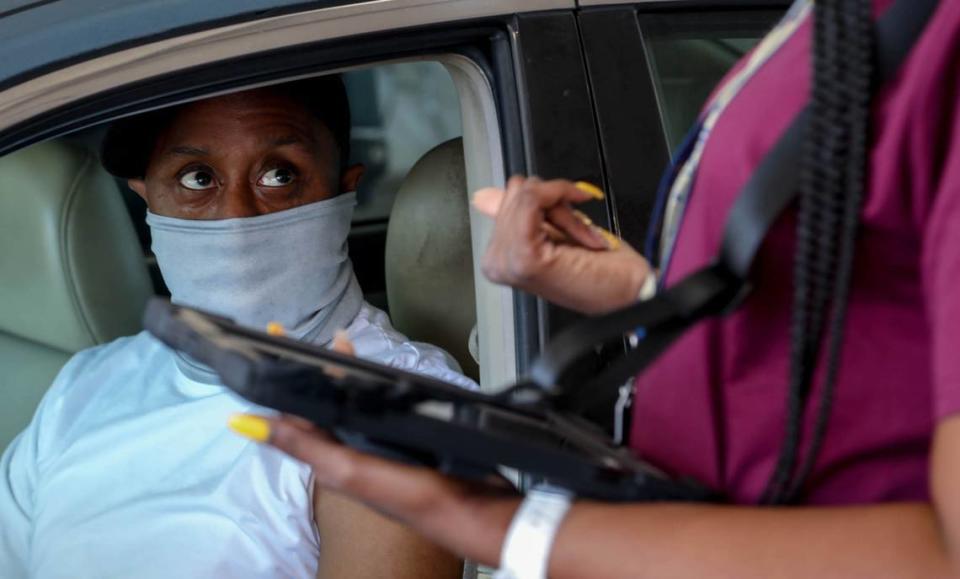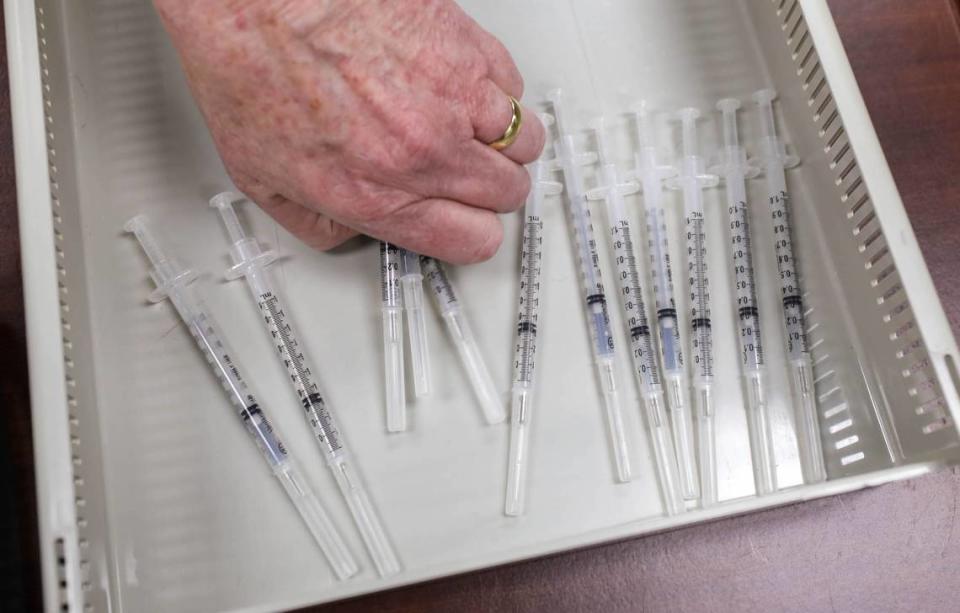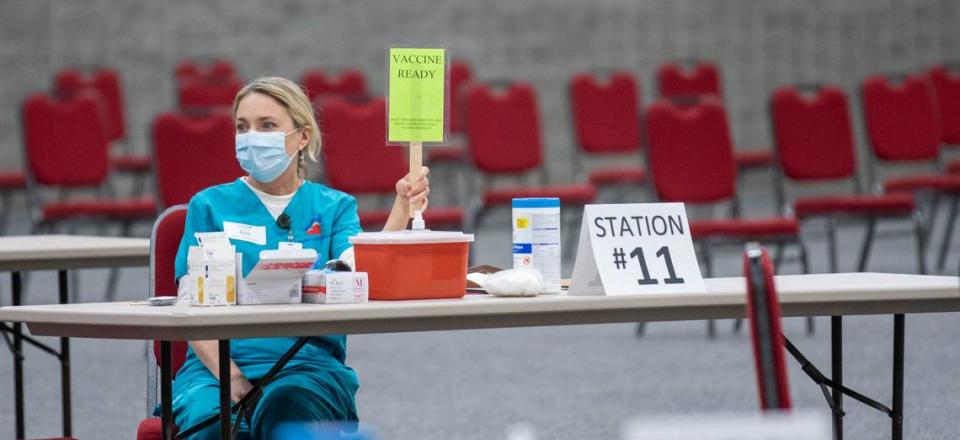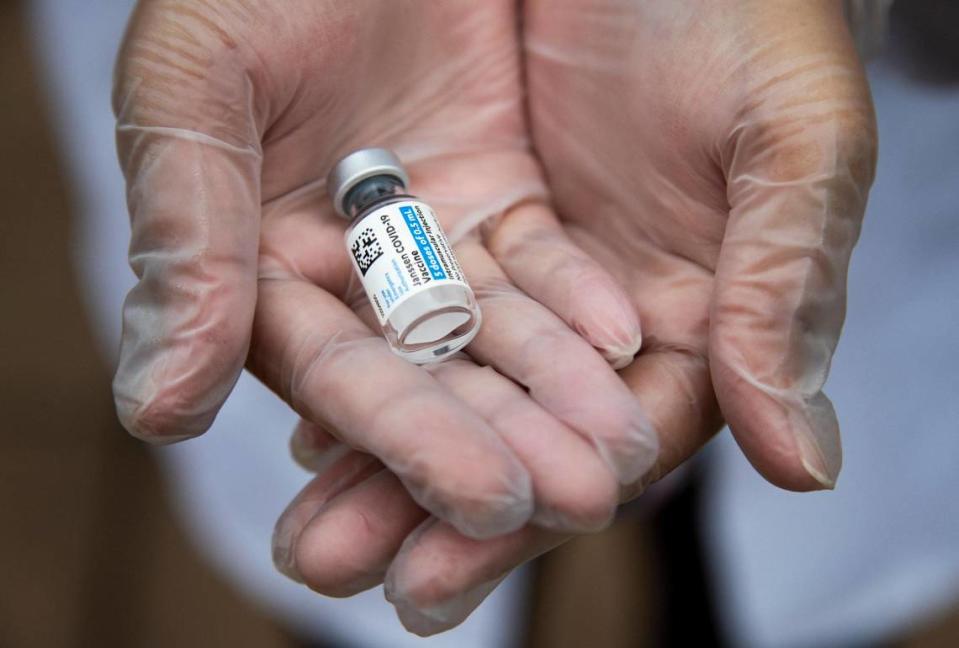155 fully vaccinated people in SC got COVID-19 in extremely rare ‘breakthrough’ cases
A quarter of eligible South Carolinians have now been completely vaccinated against COVID-19, yet state health officials have recently discovered a small number of coronavirus infections among fully inoculated people.
These cases, which are called “breakthrough” infections, are extremely rare and typically mild, according to public health experts.
It’s important to track the breakthrough cases, researchers say, to possibly identify new and troubling coronavirus mutations, if they emerge.
The cases may also provide insight into how effective the vaccines are in immunocompromised patients who have weakened immune systems and struggle to fight off infections.
The S.C. Department of Health and Environmental Control as of April 8 had identified 155 breakthrough cases in the state, according to spokeswoman Cristi Moore. Seventeen of those patients were hospitalized and at least one person had died.
About 893,400 state residents as of April 8 had completed COVID-19 vaccination.
If all of the 155 breakthrough cases were found among S.C. residents, just .01% of fully vaccinated South Carolinians experienced a rare post-vaccination infection. Roughly .001% were hospitalized with COVID-19.
Low percentages like those prove how effective the current vaccines are, experts say, including against highly transmissible variants of SARS-CoV-2, the novel coronavirus.
“Viruses mutate all the time,” said Dr. Jane Kelly, assistant state epidemiologist. “None of these mutations right now mean a change in what we’re doing, except being more careful because they spread more easily.”
The future of SARS-CoV-2, though, is unclear. How many times will the coronavirus’ genetic code change before the Palmetto State reaches herd immunity?
Monitoring for breakthrough cases can help vaccine developers and government officials confirm whether booster shots are needed to ward off new variants, experts say.

‘Non-responders for whatever reason’
DHEC has not identified any trends in the state’s breakthrough cases, like a significant share of infections among immunocompromised people, or a high proportion of cases among residents who got a particular brand of vaccine, Moore wrote in a Monday statement.
Only about 45 samples collected in breakthrough cases, meanwhile, have been sent to DHEC’s public health lab for whole genome sequencing, which is a procedure used to identify mutations in SARS-CoV-2, Moore wrote.
Changes to the coronavirus’ genetic code, like E484K, or “Eek,” can give the pathogen different characteristics. E484K, as an example, is a troubling mutation in the virus’ “spike protein,” which it uses to enter human cells.
B.1.351, a variant first discovered in South Africa that contains E484K, seemingly evades a part of the immune response triggered by Pfizer-BioNTech and Moderna’s two-dose vaccines, which target the spike protein (both vaccines are still effective against the variant, even though they appear to be less potent). Johnson & Johnson’s single-dose vaccine seems to be affected in a similar way.
DHEC as of Wednesday had reported 86 cases of B.1.351 in South Carolina.
Moore, though, wrote that the state health agency can’t sequence every breakthrough case to pinpoint whether a specific variant was involved.
“Not all these samples are available from the testing lab at the time of case identification and, for some samples that are available, there is not always enough genetic material left to sequence,” Moore wrote.
DHEC as of Monday was still analyzing the results from roughly 45 samples in breakthrough cases that the state lab sequenced, she wrote.
Regardless, Dr. Scott Curry, an infectious disease specialist at the Medical University of South Carolina in Charleston, on Tuesday said that the health care system has discovered fewer than 30 post-vaccination infections. Of those that were sequenced, the majority were “wild-type” SARS-CoV-2 cases, he said.
In other words, Curry said, most of those infections weren’t caused by variants such as B.1.351 or B.1.1.7, which was first identified in the United Kingdom.
He added that MUSC runs its own sequencing efforts.
“I looked at about four of these cases in-depth, and they’re pretty immunosuppressed, in some cases,” Curry said. “Other people are just non-responders for whatever reason or another.”
Disease experts search for answers
It’s unclear why some residents eventually contract SARS-CoV-2 after being vaccinated, said Dr. Natasha Chida, an infectious disease expert and assistant professor of medicine at Johns Hopkins University.
The coronavirus vaccines from Pfizer, Moderna and Johnson & Johnson are all very protective, she said, but they’re still not 100% effective at blocking infection.
“It’s just, from the numbers standpoint, going to happen,” Chida said of breakthrough cases.
Dr. William Schaffner, an infectious disease expert and professor of preventative medicine at the Vanderbilt University School of Medicine, added that Pfizer, Moderna and Johnson & Johnson’s initial clinical trials excluded people with serious immunocompromising illnesses and those undergoing immunosuppressive therapy (which is a standard practice in vaccine trials).
“Obviously, they weren’t going to respond to the vaccine optimally,” Schaffner said.

Now, though, as immunocompromised people are inoculated in the general public, some of them “aren’t getting the full benefit of the vaccine,” Schaffner said.
A range of medical conditions, diseases and treatments can blunt a person’s immune system, including cancer, AIDS, certain genetic disorders, chemotherapy, solid organ transplants or radiation therapy, among other things.
“I have not seen any explicit data that gives us the percentage of breakthrough cases that are immunocompromised,” Schaffner said. “However, just on the basis of ... in the occasional Zoom call or phone conference with colleagues, across the country, they are mentioning that they are occurring.”
A mid-March research letter published online in the Journal of the American Medical Association supports Schaffner’s outlook.
Researchers at Johns Hopkins Medicine found that only 17% of 436 solid organ transplant recipients produced detectable antibodies against SARS-CoV-2 after they received the first dose of Pfizer or Moderna’s vaccines. (The study’s participants weren’t fully inoculated. The Centers for Disease Control and Prevention defines a breakthrough case as someone who tested positive for COVID-19 at least two weeks after their final vaccine dose and didn’t test positive in the 45 days before their post-vaccination positive test.)
Some breakthrough infections among immunocompromised people were to be expected, Schaffner stressed, and Chida added that the current vaccines are powerful, overall.
Pfizer and Moderna, for example, recently announced that both their vaccines remained over 90% effective against COVID-19 in the six months after a second dose.
Johnson & Johnson’s vaccine, meanwhile, was 72% efficacious in a U.S. clinical trial.
“When we look at, you know, the millions of people who have been vaccinated in the U.S. and in other countries ... vaccine failure is remarkably unusual,” Chida said.
South Carolina’s low number of breakthrough cases, as an example, is comparable to other states’ data.
Georgia as of April 6 had found 372 suspected breakthrough infections, according to health agency spokeswoman Nancy Nydam.
North Carolina’s health department was aware of 111 breakthrough cases as of April 7, including seven hospitalizations and one death, spokeswoman Bailey Pennington wrote in a statement.

What are COVID-19’s ‘pathways for escape’?
DHEC in late February told health care providers to send available samples in breakthrough cases to the state’s public health lab for whole genome sequencing.
It’s important that health officials sequence every usable sample associated with the rare infections, Schaffner said.
Why?
Kelly, the assistant state epidemiologist, said current vaccines protect people against coronavirus variants such as B.1.351, which includes the E484K mutation.
“If your antibodies can’t attach everywhere (because of E484K), you might get some mild symptoms,” she explained. “But then other parts of your immune system kick in, like your B memory cells and your killer T cells, and that’s why you don’t get severe disease.”
Experts, though, are now casting a wary eye toward the future, wondering if high levels of coronavirus transmission around the globe might produce a mutation that’s able to significantly reduce the vaccines’ effectiveness.
The genetic structure of breakthrough cases, if monitored, could serve as a bellwether for particularly troublesome variants, if they form, Chida said.
“It could lead down the road to booster vaccines,” Schaffner added. “That’s something we want to be prepared for.”
Will a “super virus,” though, actually develop?
Nothing’s impossible, but there’s recently been some positive news on that front in the battle against COVID-19.
Morgane Rolland, chief of viral genetics for the Henry M. Jackson Foundation for the Advancement of Military Medicine with the U.S. Military HIV Research Program at the Walter Reed Army Institute of Research, said the detection of E484K across the world appears to suggest that SARS-CoV-2 has a limited amount of room to mutate and “escape” from vaccine-induced immune responses.
“We’re always seeing the same mutation reappearing, recurring in different backgrounds in multiple places ... independently,” Rolland said.
E484K has been found in some B.1.1.7 cases, B.1.351, the P.1 variant discovered in Brazil and the B.1.526 variant from New York City, according to the CDC.
“The space for SARS-CoV-2 is very tiny,” Rolland said. “There are not that many pathways for escape.
“I think there will be variants that could still come and happen. But if the number of infected cases really go down, then there’s less opportunity for the virus to mutate and evolve.”
Have you tested positive for COVID-19 after being fully vaccinated? Contact reporter Sam Ogozalek at sogozalek@islandpacket.com or (843) 900-6372. The Island Packet and Beaufort Gazette would like to hear about your experience.


